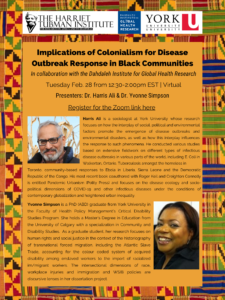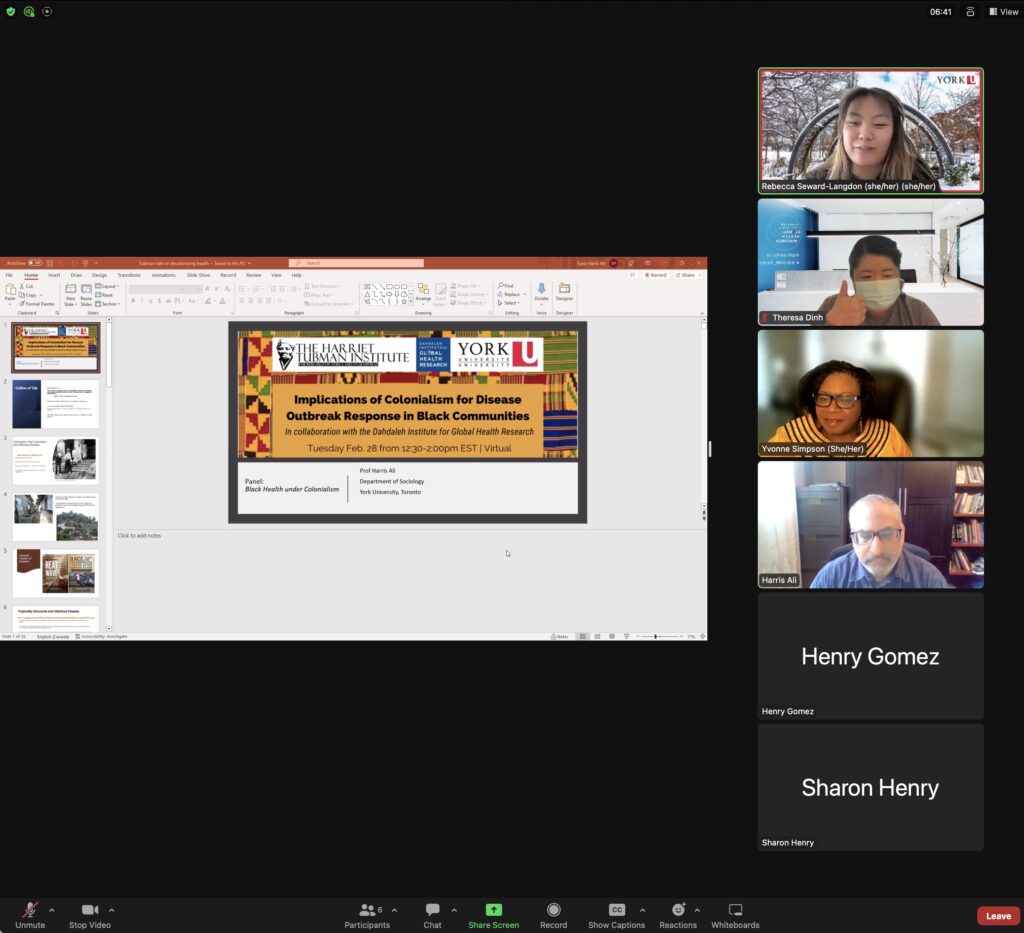Post
Published on March 2, 2023

In the final instalment of the 2023 Black History Month seminar series at the Harriet Tubman Institute, the Dahdaleh Institute's cosponsored a virtual seminar on February 28 with faculty fellow Harris Ali and Yvonne Simpson. It featured discussions on the challenges to the health and safety of Black communities within Canada and abroad as a result of a colonial legacy.
Professor Ali began with an introduction of colonial history in Freetown, Sierra Leone. He uses this case example to illustrate the spatial separation between colonial settlers and the Black population, which dictated the resources and diseases each group would have. The colonialists lived comfortably on top of the hills at higher altitudes which prevented mosquitoes from surviving and also prevented the spread of malaria. Meanwhile, the Black population lived in under-serviced slums and informal settlements, often in crowded and unsanitary conditions. Professor Ali highlighted the tropicality discourse which stated that the structures Western nations implemented benefited the West at the expense of other countries and it continues to persist today. The poor outcomes that resulted from this system in non-Western countries, would often be attributed to other factors like genetics, culture, religion being different from Western norms.
In the early 21st century, the appearance of SARS and other infectious diseases became a threat the Canadian government had to address. For many companies, they saw it as an opportunity to make a profit off vaccines. Securitization of public health was a context for vaccine nationalism; this meant Western companies that patented medications, made it impossible for other non-Western companies to produce essential vaccines. Additionally, vaccination research and testing was conducted in African nations and India because patient's rights could be violated with little repercussions. It resulted in deliberate and instrumental use of disease outbreaks by Western medical corporations and academic institutes to test vaccines without the knowledge of the patient. This created deep distrust between racialized people and receiving vaccinations.

Furthermore, Professor Ali discussed the implications of post-colonialism affecting people today in relation to health. During the Chicago heat wave, Black Americans had the highest death rate compared to White and Hispanic groups. More recently, during the COVID-19 pandemic, racialized Black Canadians in Toronto had a higher risk of contracting COVID-19 as over half the populations lived in low income housing. Black Americans were also three times more likely to die from COVID-19 than a White American.
Yvonne Simpson continued this discussion with a brief history on the Code Noir, a system that perpetuated health inequality and disability exclusion. The first ever census in North America was conducted by Jean Talon in New France. He documented all the settlements in New France but did not include the Indigenous populations, and the 401 slaves, referred to as servants.
Yvonne's research demonstrated that there is a lack of knowledge of the contributions of Indigenous and racialized immigrant workers and their record of disability. The data being kept is inconsistent and prevents any action or policies to ameliorate this problem. There is great racial inequality. Yvonne stated, "These patterns have continued from the time of the Code Noir, where anything could be done to Black bodies, and it is continuing, putting them in the most dangerous work." So much data is being gathered about crimes being committed, yet there is little to no data about occupational health and safety.
Much of our current systems have roots in colonialism. Even today, as many racialized immigrants enter the labour market working in unsafe conditions, yet, the research and census data do fully capture the demographic identity and intersections of these people. For example, census data does not differentiate between race and locations, which plays a role in the access to resources and opportunities an individual may have. Data is highly political; the Crown is unable to properly address many of these issues because of the colour-blind model they have adopted. Yvonne hopes to change this system with more accurate and complete data to better understand the occupational health and safety affecting large populations.
Watch the seminar presentation below:
Connect with Harris Ali
Themes | Global Health & Humanitarianism |
Status | Active |
Related Work |
N/A
|
Updates |
N/A
|
People |
You may also be interested in...
Global & Environmental Health Lab
As a top-tier research group, the Global & Environmental Health Lab is committed to developing cross-culturally validated resource insecurity tools including housing, good, energy, and water insecurity scales that can be used in most low ...Read more about this Project
Recap — Utilizing Academic Research to Support Real-Time Decision-Making in Health and Humanitarian Crises
On November 30th, Dr. Ahmad Firas Khalid delivered an interactive seminar about how the Canadian Red Cross makes decisions using scientific, real-time evidence amidst health and humanitarian crises. Twenty-six participants discussed the Red Cross' involvement ...Read more about this Post
Recap — Research Exploration: Taking a Critical Social Science Approach to Global Health Research
The Dahdaleh Institute held its fourth annual Critical Social Science Perspectives in Global Health Research Workshop (CPGH) as a hybrid event on Wednesday, March 29, 2023. This year, over 30 researchers participated to discuss the ...Read more about this Post
